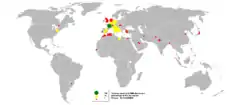
The Ninth Tunisia Plan was an economic development plan implemented by the government of Tunisia from 1996 to 2001.[1]
President Ben Ali established the Ministry of International Cooperation and Investment in June 1992, appointing Mohammed Ghannouchi as Minister. The Tunisian government began negotiations with Belgium, culminating in a free-trade agreement in 1995. Tunisia began producing the Miskar natural gas field that same year in cooperation with Agip of Italy, British Gas plc, and Elf-Aquitane of France. In 1996, when the program began, 73% of Tunisia's foreign trade was with Europe, not Northern Africa.[1]
Results
Inflation lowered to 2.7% in 1999. In 1987, when Ben Ali seized power in a coup d'état, the unemployment rate rose to 12%. By 2001, the government had cut the unemployment rate in half. School attendance increased by 9%, from 90% in 1988 to 99% of the population in 2001. Life expectancy increased from sixty-seven years in 1988 to seventy-three years in 2000. On the other hand, external debt continues to plague Tunisia's economy. Tunisia owed $11 billion in 1999, spending between 45% and 50% of GDP and 20% of export earnings on debt alone. The Tunisian government spends more on debt than public education or health care.[1]
See also
References